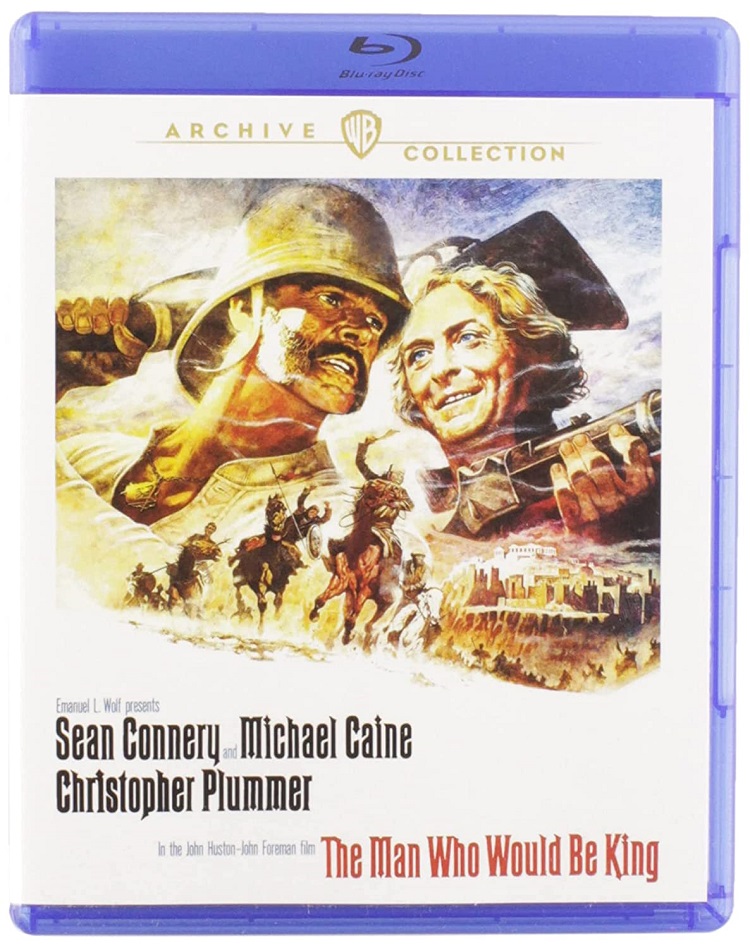
Written by Chris Morgan
A movie starring Michael Caine and Sean Connery, directed by John Huston, and based on a Rudyard Kipling novel certainly has a great deal of name cache. This was the power base behind the 1975 film The Man Who Would Be King. However, the question remains, did all this talent lead to a promising result?
The movie begins with the end of the story, as Rudyard Kipling (Christopher Plummer) is met by a grizzled, mysterious figure who we then find out is Caine’s Peachy Carnehan. Of course, at this point we don’t know anything about this character, but we will, once he begins to regale us with the tale of his adventure. The story begins in the 1880s in British-controlled India, which, to anybody who is familiar with Kipling, is not surprising. Caine’s Peachy and Connery’s Danny Dravot, who is resplendent with the most ridiculous sideburns you will ever see, are two former soldiers of the British army, who are now left adrift in India with nothing going on in their lives. Now, they live as small-time crooks, but they have bigger plans, which they tell to Kipling as he notarizes a contract between the two men.
Their plan, in essence, is to travel across India and Afghanistan, through deserts and mountains and places where no white traveler has ever gone, to get to Kafiristan, a remote region full of mystery. Upon arrival, they hope to use their skills to first curry favor with the local government, before overthrowing it and becoming kings in their own right. An interesting premise, to be sure.
The journey is indeed treacherous, but it doesn’t actually make up quite as much of the movie as you might expect. Much more of it is spent in Kafiristan, where Peachy and Danny find themselves among very primitive, savage people organized into several different villages. They then put their plans in place, with complications occuring along the way. Based on what happens in the beginning, you may be able to guess to some degree how things turn out, but how it gets there may surprise you.
It also may disappoint you, because at times the movie becomes a slog. It stagnates a bit once they arrive in Kafiristan, and the plot relies on a couple of coincidences that may be a bit of a stretch. The film also doesn’t quite seem sure what it wants to do in terms of storytelling, and the paths they choose are often less than ideal. The beginning of the movie is enjoyable, and the trek to Kafiristan is epic in scale and fairly exciting, once they arrive the movie is somewhat mediocre.
The fact the only two notable characters are Peachy and Danny doesn’t help, and neither of them is exactly great. Caine and Connery are distinctive, highly lauded actors, but Connery’s acting is also a bit limited despite all the accolades he’s received. Huston’s direction is adequate. Some of the scenes are a bit busy, although that occasionally seems to be the intention, particularly in the crowded streets of India. He does give himself some vast scenery to work with, and he makes the most of it much of the time. The other main quibble with the movie is the portrayal of the villagers of Kafiristan. They are uniformly not just simple and uneducated, but utterly savage to boot. This is, for obvious reasons, problematic.
The Man Who Would Be King is a decent enough film. The big names do not yield terribly positive results, however. The story stagnates, the characters aren’t all that engaging, the script is middling at best, the acting is no more than decent, and even the direction does not enduce much praise. There aren’t a ton of major issues, but there conversely aren’t many moments to celebrate. Unless you are trying to work your way through the entire filmographies of Huston, Caine, and/or Connery, you can skip this movie and not be worried you are missing much.